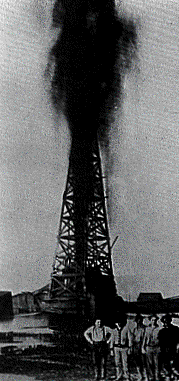Tuesday, February 19, 2008
Oil tops $100 barrel

Oil closed above $100 a barrel for the first time today. This has long been considered a psychological trading barrier, a point above which parameters were undefined. It is a bit of misconception because the parameters are always nebulous and being continually reset by all the players in a given trading market. There is a risk, however, as with any perceptual barrier, that the perception does define the reality, and because an important psychological threshold, if only to the players involved, has been crossed, the rules (for price speculation) could be in even more flux than normal. A run-up of prices from this point is certainly a significant risk.
Sadly, experts indicate that even without further price increases for crude oil, unleaded gas prices in America will likely reach $3.50 to $3.75 gallon in the coming weeks. In states where the price is already this high, it will likely go higher. It is relevant to note, that this is speculation and opinions vary. This is not crude oil's all time inflation-adjusted price record either, that was $103.35/barrel in April of 1980.
The rise in crude oil prices on the New York Mercantile exchange was attributed to, among other things, continued strong demand in China and India, even as the United States slipped into recession and demand here eased. In addition to the risk premium the Bush administration's offensive war has wrought, recent weeks have also seen production problems, in Iraq, Venezula and Nigeria that have fostered supply disruptions, as well as worries about an OPEC production cut.
Labels: Economy, Politics, Pop Culture
Comments:
Informative article regarding the economics surrounding the inflation of oil prices: http://www.foreignpolicy.com/story/cms.php?story_id=4045 (only slightly dated, Nov 07)
Anon-
Definitely an interesting read. I agree completely that there is scads of speculation in oil led by large global financial players. It is certainly possible that they are inflating a faux bubble based on fear and that the price of oil could come rocketing back down. However, this bubble bursting, unlike the housing and stock market equity collapses, would be to America's advantage.
The stock market decline and the housing price decline hit the little person and middle America hard. (even if it hit global financial institutions harder.) In this case, however, the small capitalist and entrepreneur would be helped not hurt by the bubble bursting, the price of oil has knock on effects all over the economy.
In the meantime the Bush administration has led us to the brink of a 1970's economic malaise, stagflation. (Characterized by high inflation, esp. in food and energy prices, coupled with low or zero growth. In this case, not only low GNP growth, but extremely low wage growth.)
I disagree, however, with the speaker's premise that there are not demand based pressures on supply. He, F. Gheit of Oppenheimer & Co., cites 4 billion barrels of global inventories worldwide. This number is specious because the bulk of it is in emergency reserves that the governments hoarding it will never release. Further, limited refining capacity and under investment by state run firms in new drilling capacity is crimping supplies. (This is especially critical for America because to of our biggest suppliers are two of the worst offenders when it comes to under-investing in critical infrastructure, Mexico and Venezuela.)
Post a Comment
Definitely an interesting read. I agree completely that there is scads of speculation in oil led by large global financial players. It is certainly possible that they are inflating a faux bubble based on fear and that the price of oil could come rocketing back down. However, this bubble bursting, unlike the housing and stock market equity collapses, would be to America's advantage.
The stock market decline and the housing price decline hit the little person and middle America hard. (even if it hit global financial institutions harder.) In this case, however, the small capitalist and entrepreneur would be helped not hurt by the bubble bursting, the price of oil has knock on effects all over the economy.
In the meantime the Bush administration has led us to the brink of a 1970's economic malaise, stagflation. (Characterized by high inflation, esp. in food and energy prices, coupled with low or zero growth. In this case, not only low GNP growth, but extremely low wage growth.)
I disagree, however, with the speaker's premise that there are not demand based pressures on supply. He, F. Gheit of Oppenheimer & Co., cites 4 billion barrels of global inventories worldwide. This number is specious because the bulk of it is in emergency reserves that the governments hoarding it will never release. Further, limited refining capacity and under investment by state run firms in new drilling capacity is crimping supplies. (This is especially critical for America because to of our biggest suppliers are two of the worst offenders when it comes to under-investing in critical infrastructure, Mexico and Venezuela.)

